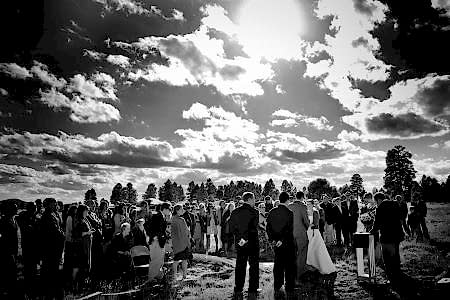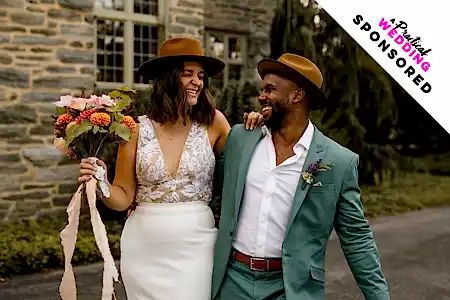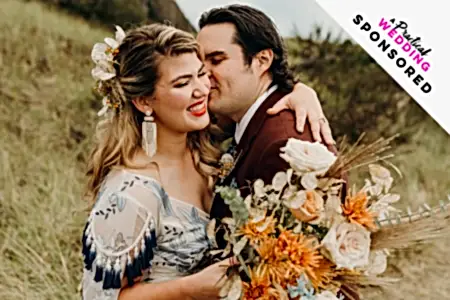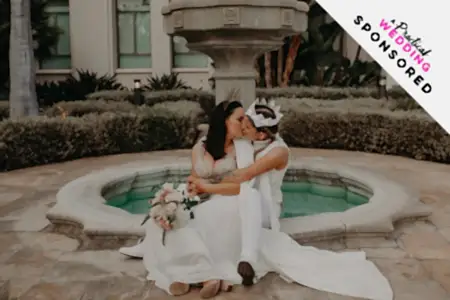In the past few weeks, I wrote a piece about finding a way to make a traditional wedding service personal, and Rachel (DDay, in the comments) wrote a piece about crafting a non-traditional service. After that post, we asked you to contribute your best tips and tricks on secular and/or non-traditional services. Today Rachel is back, summing at all up, and trying to create a Secular Wedding Resource for all of us.
After those posts, Kristina of Lovely Morning and 100 Layer Cake wrote me a really lovely and spontaneous email about their secular wedding service. She called it, “one of my very favorite parts of the entire day, complete with hummingbirds chasing each other in the flowers as the sun was going down,” and expressed her wish that everyone get to have that experience. So today we take a shot at that. Because when we collectively pull up our chairs around you before you say your vows, we’re there for you. We want the purest expression of who you are: religious, non-religious, traditional, non-traditional. We want to “one of the lucky ones who stood in the middle of nowhere, right next to neverland, and witnessed the declaration of real love.” So let us join you there. And with that, I bring you Rachel (with some notes from me):
A little while back, Meg wrote about “traditional” ceremonies, and then I wrote about “non-traditional” ceremonies. I think we could just call them religious and secular, because traditional doesn’t really cover it, since we all may define the term differently. My wedding was secular, but was not without tradition. But I think if we can get away from semantics, we can get down to what’s important – creating meaningful wedding ceremonies, no matter what your background is. With that, the following is my attempt to sum up all the great advice offered in the comments, for a proper Secular Wedding Resource.
THE best piece of advice I saw in the comments was from Caitlin, who said, among other smart things, “Before you write a ceremony from scratch, I think you need to figure out what you believe about marriage fundamentally. That has to be your foundation…” And that really resonated with me because honestly, I think we sort of figured that out as we went along, and some of our struggle with finding the right pieces to put together might have been avoided if we had sat down first and really thought about how we define marriage and what it means to us. We did that, sort of, but maybe not with exactly that sense of purpose.
Once you have that foundation, I think we can all agree that the main thing is to find a great officiant. And “great officiant” can mean many things – if you’re a great writer, you don’t need an officiant to be a great writer, you need an officiant who is a good public speaker and will let you write the ceremony yourself. If writing is not your bag and you have no clue what to do, that’s when you need an experienced officiant to guide you. Something I think is universally applicable: the person who performs your ceremony should be a person you trust to do what you’ve asked them to do (whether they are a hired officiant or a friend/family member); someone who is fully on board with the type of ceremony you want, who will guide you and help you stay present through the service; and someone who will not take this opportunity to promote their own agenda to your captive audience.
And in that spirit, here is my list of the very best tips and tricks given in the comments:
Tips
- First, figure out what you believe about marriage fundamentally. This has to be your foundation, and then when you wade through the insane amount of books/suggestions/google results, you will at least know what to use when/if you see it.
- The risk of having something that is very unfamiliar to guests is going to always be less of a risk than having a ceremony that is untrue to who you both are as a couple.
- When you see a craigslist ad that reads something like, “I do biker weddings. Large weddings. Outdoor weddings.” Go for it!
- Don’t be afraid to incorporate group singing (Editors note: we did it! And we made them all sing a song they didn’t know in HEBREW! It was great. Do it.) Just because you’re not doing hymns doesn’t mean it’s not going to work or feel meaningful. You can make it easier on your guests by providing the songs in advance and/or printing lyrics in the programs. (Editors note: All you really need is a song leader and lyrics, I swear!)
- Don’t be afraid to lighten the mood.
- If you want to ask your guests to stand up and give a blessing or a say something impromptu during the ceremony – cheat, and don’t make it 100% impromptu. Ask one or two people ahead of time if they’d like to prepare something to say. While they are speaking, others may find the courage to take their turn. If nobody does, at least you had one or two stand up.
- If you are inspired by Unitarian or Quaker services, or use wording or traditions that were previously unfamiliar to you, do your research and make sure you know what you’re using, and you know what it means to use it. Example: the “Apache Wedding Blessing” is a beautiful sentiment, no shame in using it as long as you note its source (and maybe change the name of it to “Blessing From the Movie Broken Arrow” or something like that).
- If some part of the structure isn’t working for you, you don’t have to make it work. Don’t be afraid to throw things out.
Officiants
Find the right officiant! Interview a few candidates, and ask them questions like:
- What was your favorite wedding ceremony you’ve performed?
- What is your stance on Marriage Equality?
- What do you wear when you perform a wedding? (Editors note: you wouldn’t think you needed to ask this, but, um, you might. I’ve seen some shocking lapses of… professionalism? Taste? That clearly surprised the couple at the non-altar. Fun!)
- It’s helpful to come prepared with at least a few aspects of your ceremony that are important to you, then make sure the officiant is on board. Don’t be afraid to make specific requests up front.
But more than all that, here is what you want to know for sure: do you like your officiant? If you think it’s important to like your photographer, you should multiply that by a thousand for your officiant. Spend some time chatting with them. See if you’re philosophically more-or-less on the same page. See if they are socially comfortable enough to make small talk (because yes, you need this skill if you’re leading a wedding). See if they are a warm person. See if they make racist jokes (Editors note: this is totally a true story I heard about an officiant interview gone wrong). See if they’ll take the time to get to know you. See if you LIKE them. This person is presiding over an important moment of your life, you should trust them on a gut level.
Hopefully, with the above things figured out, the rest will be easy-peasy. Below are some helpful links and tips for filling in any gaps. (If you’re still on the hunt for readings, you’ll want to check out the archives for Amanda of First Milk’s amazing Words to Read When You Wed series.
Reading Materials, For Extra Credit:
The Wedding Ceremony Planner: The Essential Guide to the Most Important Part of Your Wedding Day
The New Jewish Wedding by Anita Diamant
Picture by Melissa Dunstan Photography, from this wedding







